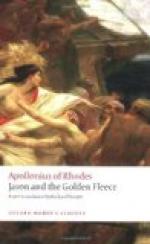And Talos, the man of bronze, as he broke off rocks from the hard cliff, stayed them from fastening hawsers to the shore, when they came to the road-stead of Dicte’s haven. He was of the stock of bronze, of the men sprung from ash-trees, the last left among the sons of the gods; and the son of Cronos gave him to Europa to be the warder of Crete and to stride round the island thrice a day with his feet of bronze. Now in all the rest of his body and limbs was he fashioned of bronze and invulnerable; but beneath the sinew by his ankle was a blood-red vein; and this, with its issues of life and death, was covered by a thin skin. So the heroes, though outworn with toil, quickly backed their ship from the land in sore dismay. And now far from Crete would they have been borne in wretched plight, distressed both by thirst and pain, had not Medea addressed them as they turned away:
“Hearken to me. For I deem that I alone can subdue for you that man, whoever he be, even though his frame be of bronze throughout, unless his life too is everlasting. But be ready to keep your ship here beyond the cast of his stones, till he yield the victory to me.”
Thus she spake; and they drew the ship out of range, resting on their oars, waiting to see what plan unlooked for she would bring to pass; and she, holding the fold of her purple robe over her cheeks on each side, mounted on the deck; and Aeson’s son took her hand in his and guided her way along the thwarts. And with songs did she propitiate and invoke the Death-spirits, devourers of life, the swift hounds of Hades, who, hovering through all the air, swoop down on the living. Kneeling in supplication, thrice she called on them with songs, and thrice with prayers; and, shaping her soul to mischief, with her hostile glance she bewitched the eyes of Talos, the man of bronze; and her teeth gnashed bitter wrath against him, and she sent forth baneful phantoms in the frenzy of her rage.




